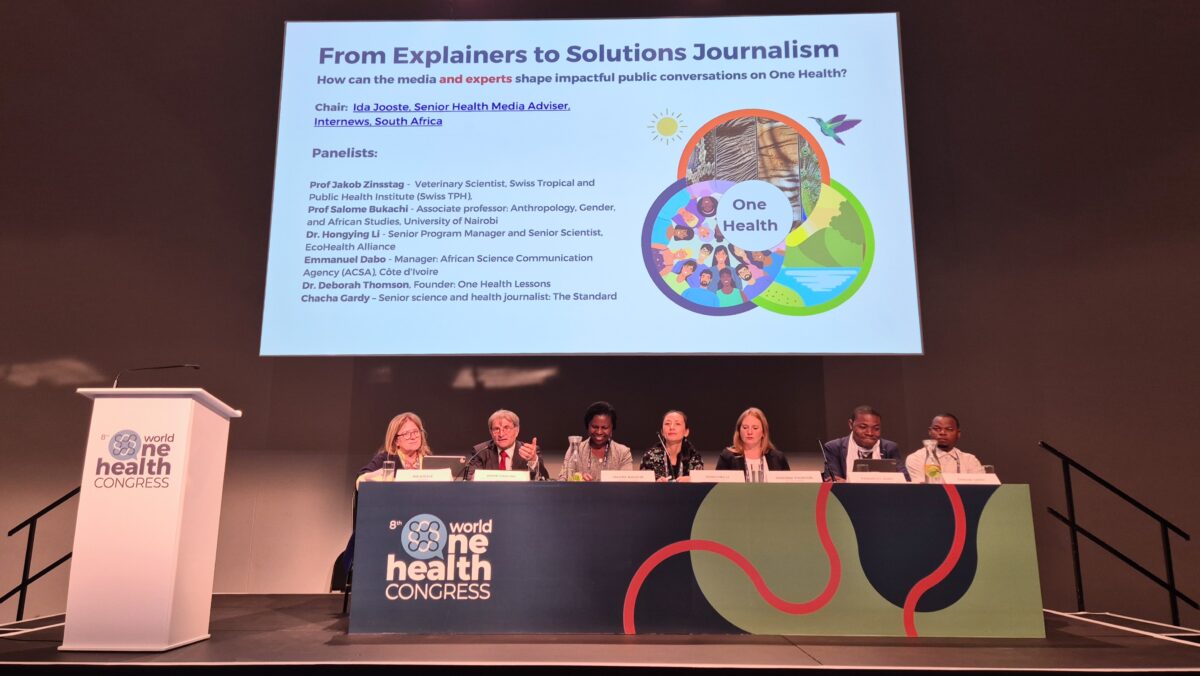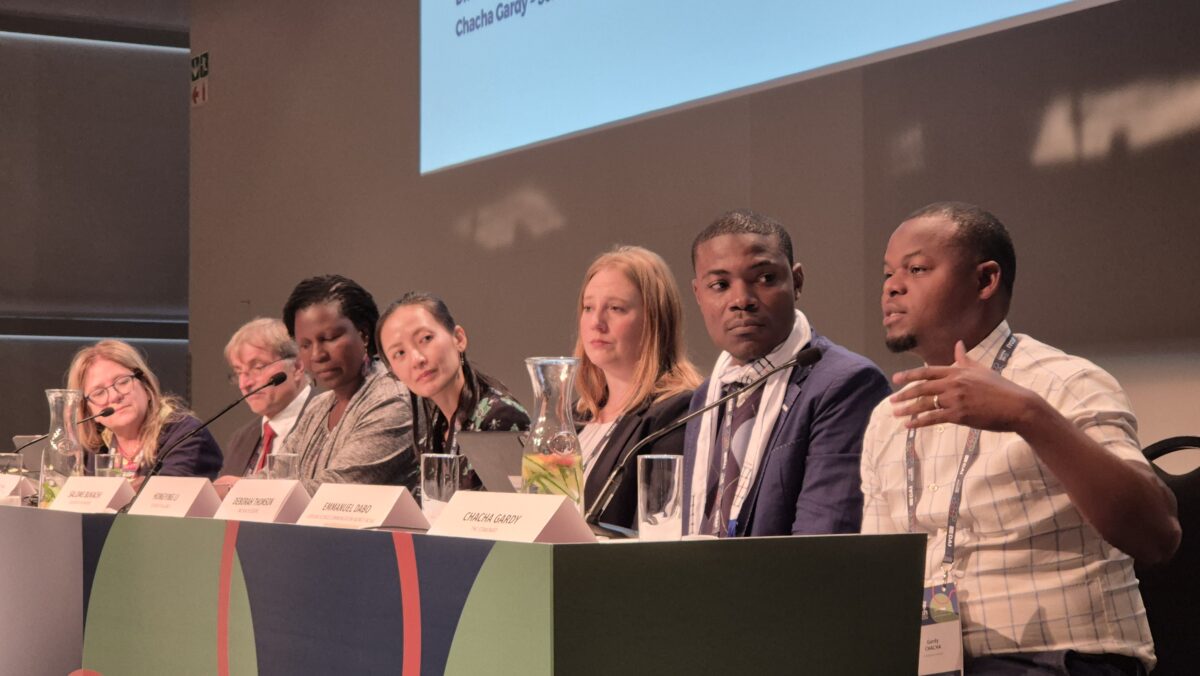At the 8th World One Health Congress held 20 – 23 September 2024 in Cape Town, experts came together to explore how the media can shape impactful public conversations on One Health. The session, “From Explainers to Solutions Journalism,” chaired by Ida Jooste, Internews’ Senior Health Media Advisor, brought together a distinguished panel of specialists who shared their experiences and insights on how to better communicate the complexities of One Health.

The Challenge of Communicating Complexity
Jooste opened the session by acknowledging the hurdles journalists face when covering One Health. With its multi-disciplinary nature, encompassing complex scientific concepts, the challenge for communicators lies in simplifying the issues while retaining their significance. “There’s policy, fear, phylogenetics, metagenomics, suffering, drought, flooding, hunger, and antimicrobial resistance. It’s hard to know where to begin,” she said.
With diverse backgrounds spanning public health, veterinary science, anthropology, and science journalism, the panelists delved into how journalists can translate the interconnectedness of human, animal, and environmental health into relatable, actionable stories for the public.
Jooste underscored the importance of creating stories that speak not only to policymakers and scientists but also to more lay audiences—a representation of how stories need to be relatable to everyday people. The task, she argued, is making One Health issues intuitive and clear, despite the many layers of complexity that accompany them.
The panelists included:
- Prof. Jakob Zinsstag, a veterinarian and epidemiologist from the Swiss Tropical and Public Health Institute, Switzerland
- Prof. Salome Bukachi, a medical anthropologist from the University of Nairobi, Kenya
- Dr. Hongying Li, Senior Scientist at EcoHealth Alliance, United States
- Emmanuel Dabo, Executive Director of the African Science Communication Agency (ASCA), Ivory Coast
- Dr. Deborah Thomson, a veterinarian, science policy advisor, and founder of One Health Lessons, United States
- Chacha Gardy, a science journalist from The Standard, Kenya
Each panellist brought a unique perspective to the conversation. Together, they painted a picture of the broad scope of One Health and the media’s role in elevating these discussions.
One Health in Action: Local Stories that Resonate
Prof. Bukachi discussed her experience working in Kenya and how One Health issues are already embedded in the daily lives of many communities. “Communities are practicing One Health every day,” Bukachi said, “but they don’t call it that.” She described a project where local authorities turned a waste dump into a public park, improving the health and environment of the surrounding community. While this is a clear example of One Health in action, Bukachi pointed out that the challenge lies in telling such stories in ways that the public and policymakers can recognize and value.
For Bukachi, it’s not just about highlighting the science but about showing how One Health principles manifest in everyday life. As a medical anthropologist, she emphasized the need for journalists to take cultural context into account when reporting on zoonotic diseases or environmental challenges. “One of my roles is as a cultural broker,” Bukachi explained, “to help communities, policymakers, and researchers understand how behavior, health, and the environment are interconnected.”
Communicating Behavior Change in One Health
Dr. Li, Senior Scientist at EcoHealth Alliance, shared her insights on behavior change communication as a key component of One Health. Working at the intersection of health and conservation, Li highlighted the importance of developing communication strategies that resonate with specific audiences. “It’s not just about delivering information,” she said. “It’s about how we encourage behavior change through clear communication.” For Li, the One Health lens provides a way to understand the complex relationships between humans, animals, and the environment, but journalists must distil that complexity into actionable messages that inspire change.
Li pointed out that while explaining the connections between zoonotic diseases and environmental health is important, journalists also need to account for local perceptions and behavior. She cited her work developing behavior change strategies in communities at risk of zoonotic diseases as an example of how One Health communication needs to be rooted in both scientific evidence and local realities.
Bridging the Gap Between Science and Storytelling

Chacha Gardy, a science journalist from The Standard, Kenya, spoke about the gap between scientists and journalists, explaining how technical jargon often alienates the public. Gardy emphasized the need for storytelling that goes beyond complex scientific terms and brings the issues to a human level. “Scientists use terms like molecules and atoms, but the average person just wants to know how it affects them,” he said. For Gardy, the key to success in science communication is translating abstract concepts into relatable stories that impact the lives of ordinary people.
“If I tell my grandmother I’m at a One Health conference, she won’t know what I’m talking about. But if I explain how climate change is affecting her crops, she’ll get it,” he explained, highlighting the importance of using storytelling to simplify and humanize complex scientific ideas.
Storytelling and the Power of Local Knowledge
Dr. Deborah Thomson, founder of One Health Lessons said age and cultural appropriateness were key. Thomson, who has developed One Health lessons for audiences ranging from children to policymakers, stressed the importance of tailoring messages to suit different demographics. “You can’t communicate the same way to a six-year-old and a 60-year-old,” she explained. Thomson’s work has emphasized that effective communication is about understanding the audience’s needs, expectations, and language.
Thomson also pointed out the critical role that journalists play in driving policy change, especially when it comes to One Health. “At the end of the day, we need buy-in from policymakers and communities. The way to get there is through clear, concise, and compelling communication,” she said.
Using Solutions Journalism to Drive Action
“We’re not here just to tell people One Health is good,” said Emmanuel Dabo of the African Science Communication Agency (ASCA), “we’re here to show them the social and economic benefits.” Dabo emphasized the importance of shifting from stories centred around problems, towards solutions-focussed journalism. By focusing on the tangible outcomes of interdisciplinary collaboration—whether in managing waste, improving agricultural practices, or preventing disease—Dabo argued that journalists can help translate the abstract idea of One Health into meaningful action.
Dabo also spoke about the importance of collaboration between scientists and journalists in creating impactful stories. He urged scientists to recognize that journalists need stories that are not just scientifically accurate but also relatable and engaging. “We work with scientists to co-create stories that highlight solutions, not just problems,” Dabo explained, adding that this approach is essential to motivating both public and political engagement.
The Role of Science in Building Trust
Prof Jakob Zinsstag had a warning: “Science is in a cognitive and moral crisis, People don’t believe in vaccines, in science, in institutions. We need to change that”, he said. Zinsstag is a leading veterinarian and epidemiologist from the Swiss Tropical and Public Health Institute. In his contribution, he highlighted the role of trust in science communication, especially in a time of widespread misinformation. For Zinsstag, storytelling is a powerful tool to rebuild trust, but it must be accompanied by collaboration between scientists and journalists.
Zinsstag emphasized the need for journalists to be involved throughout the research process, not just at the end when the results are published. By co-creating stories and documentaries with scientists, journalists can help ensure that One Health stories are both accurate and accessible. “One Health isn’t just about data and papers,” Zinsstag said. “It’s about real people and real solutions.”
From Communication to Action
As the session came to a close, the panellists agreed that collaboration is key to advancing One Health. Effective communication requires partnerships between scientists, journalists, and policymakers to ensure that stories are accurate, engaging, and drive action. “Journalists don’t need to know everything about the science—they just need to know how to tell the story in a way that moves people to care and to act,” said Jooste.
By focusing on concrete solutions, emphasizing local knowledge, and using storytelling to create empathy, the media can play a pivotal role in shaping public conversations about One Health—and in motivating people to act on the world’s most pressing health and environmental challenges.
The HJN, together with sister Internews network the Earth Journalism Network (EJN), are dedicated to providing journalists with the necessary resources and support to report effectively on One Health. Check out some resources on One Health reporting below!